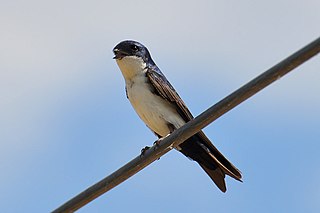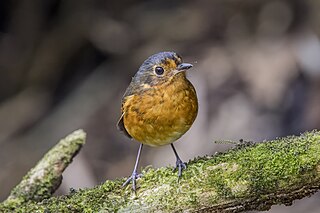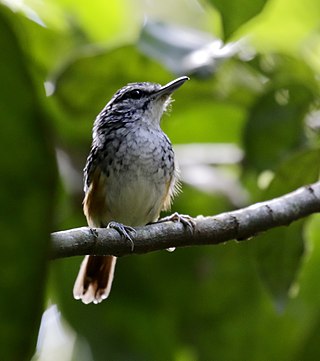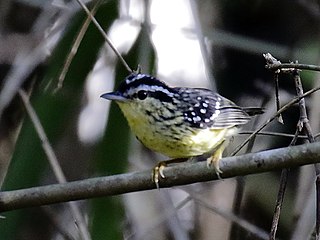
The blue-and-white swallow is a passerine bird that breeds from Nicaragua south throughout South America, except in the deserts and the Amazon Basin. The southern race is migratory, wintering as far north as Trinidad, where it is a regular visitor. The nominate northern race may have bred on that island.

The curve-billed tinamou is a type of tinamou commonly found in high-altitude grassland and shrubland habitats in the Andes of South America.

Bolitoglossa peruviana is a species of salamander in the family Plethodontidae. It is found in Ecuador and Peru. Its natural habitats are subtropical or tropical moist lowland forests, plantations, and heavily degraded former forest.

The coastal miner is a species of bird in the subfamily Sclerurinae, the leaftossers and miners, of the ovenbird family Furnariidae. It is endemic to Peru.

Grallaricula is a genus of bird in the family Grallariidae.

The rusty-breasted antpitta is a species of bird in the family Grallariidae. It is found in the Andes of Colombia and Venezuela. Its natural habitats are subtropical or tropical moist montane forest and heavily degraded former forest.

The ochre-breasted antpitta is a species of bird placed in the family Grallariidae. It is found in Bolivia, Colombia, Costa Rica, Ecuador, Panama, and Peru. Its natural habitat is subtropical or tropical moist montane forests.

The crescent-faced antpitta is a species of bird in the family Grallariidae. It is found in Colombia and Ecuador. Its natural habitat is subtropical or tropical moist montane forest. It is becoming rare due to habitat loss.

The scallop-breasted antpitta is a species of bird in the family Grallariidae. It is endemic to the Venezuelan Coastal Range.

The slaty-crowned antpitta is a species of bird placed in the family Grallariidae.

The ochre-fronted antpitta is a species of bird in the family Grallariidae. It is endemic to Peru.

The white-chinned thistletail, or colicardo barbiblanco in Ecuador, is a species of bird in the Furnariinae subfamily of the ovenbird family Furnariidae. It is found in Colombia, Ecuador, Peru, and Venezuela.

The parrot-billed seedeater is a small species of bird in the family Thraupidae. It is found in various shrubby habitats in western Ecuador and western Peru. Outside the breeding season, it is quite social and frequently seen in flocks with other small seed-eating birds.

The black-backed tanager is a bird species in the Thraupidae family. It is endemic to the forests and shrubs of south-eastern Brazil. When first described, it was mistakenly believed that it originates from Peru, leading to the misleading scientific name peruviana. It is closely related to the chestnut-backed tanager, and the two have sometimes been considered conspecific.

The rose-fronted parakeet, known as the rose-fronted conure in aviculture, is a species of bird in the subfamily Arinae of the family Psittacidae, the African and New World parrots. It is found in Bolivia, Brazil, Ecuador, and Peru.

The Peruvian warbling antbird is a species of bird in the family Thamnophilidae. It was considered a subspecies of Hypocnemis cantator, but based on vocal differences and to a lesser degree differences in plumages, it has been recommended that they be treated as separate species. As presently defined, the Peruvian warbling antbird includes a single subspecies, saturata. It has a black, white, and grey head and breast, with rufous flanks and a dull brown lower back and tail.

The yellow-breasted warbling antbird is a species of bird in the family Thamnophilidae. Until recently, it was considered a subspecies of Hypocnemis cantator, but based on vocal differences and to a lesser degree differences in plumages it has been recommended treating them as separate species. As presently defined, the yellow-breasted warbling antbird includes a single subspecies, collinsi.

The Sucre antpitta is a species of bird placed in the family Grallariidae.
Cornus peruviana is a species of tree in the family Cornaceae native to montane forests of southern Central America and western South America, from Costa Rica and Venezuela south to Bolivia.

The rufous-breasted antpitta or leymebamba antpitta is a species of bird in the family Grallariidae. It was first described by American ornithologist and entomologist Melbourne Armstrong Carriker. It is found in Peru and western Bolivia. Its natural habitats are subtropical or tropical moist montane forest and heavily degraded former forest. It has been recently considered a subspecies of Grallaricula ferrugineipectus.




















